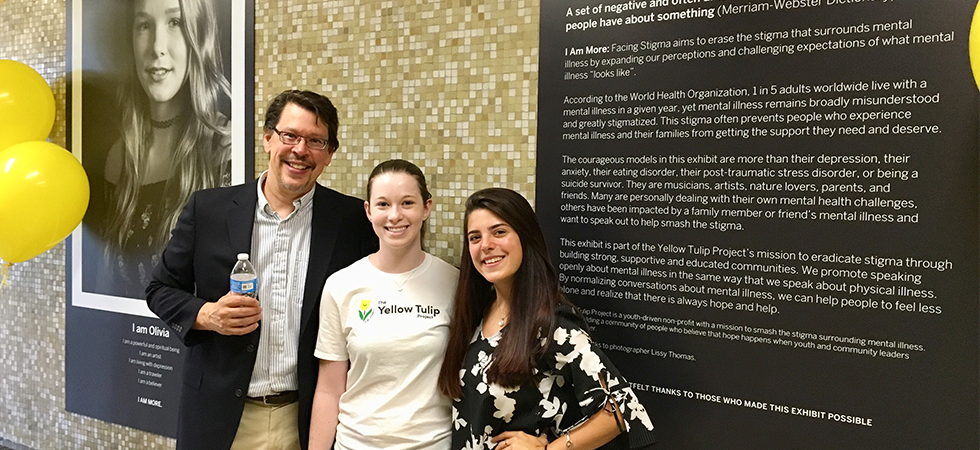Exhibit Features Assumption Professor and Student Research on Mental Health

Paul M. Piwko, visiting assistant professor of accounting, and Alexandra Orlandi ’19, a psychology major and human services and rehabilitation studies minor, recently spoke about their research into mental health exhibitions during the opening of a new exhibit at Logan International Airport in Boston.
Prof. Piwko and Orlandi were invited to speak at the opening by the Yellow Tulip Project (YTP), a nonprofit organization based in Portland, ME, that “focuses on smashing the stigma that surrounds mental illness and building a community where people realize there is help and hope out there.” YTP was unveiling its exhibit, I Am More: Facing Stigma at the Airport, a series of black-and-white photos meant to challenge the idea of what mental illness looks like. The message will receive international exposure with its new location at Logan Airport’s Terminal E.
Prof. Piwko and Orlandi, who have been working towards developing a business model for a virtual National Museum of Mental Health, spoke about how I Am More fits within the context of the emerging trend of exhibits about mental health, and about what makes exhibits uniquely suited for advancing understanding and dialogue about mental health.
“Something historic is happening right now. Forward thinkers like those at Massport and the New Jersey Transit Authority are leading the country in placing exhibitions about mental health in high-traffic public spaces,” Prof. Piwko said. “Innovators like the Yellow Tulip Project and the Science Museum of Minnesota are on the front end of an emerging trend in developing exhibitions that take on stigma and teach us how to speak about mental health. Heroes, like those of I Am More are changing society’s understanding and attitudes about mental illness, and being well.”
Prof. Piwko added that in 20th Century America, exhibitions were an influence on public health. Over 100 years ago, three quarters of a million visitors attended a tuberculosis exhibition at the American Museum of Natural History in New York City. Tuberculosis could have easily been learned through flyers and pamphlets, but there is something more personal about hearing someone’s story and experience. A face-to-face interaction has the power to create a real emotional reaction.
“Exhibits are a safe, and voluntary, space for learning,” said Orlandi. “Visitors aren’t pressured to share their thoughts, interpretations, and emotions. They can explore and experience the exhibit in their own personalized way, and pace. Judgement does not exist.”
Orlandi explained that exhibits are powerful mediums in decreasing stigma around mental health because they “provide a vocabulary and mental constructs for thought and feelings that have historically been unspoken and for which language is underdeveloped.” She added that a visitor can learn about the facts and figures about the number of people who suffer from mental health issues, and the artwork and writing about mental health stories and experiences “pulls back the curtain society closes on the realness of mental illness.”
